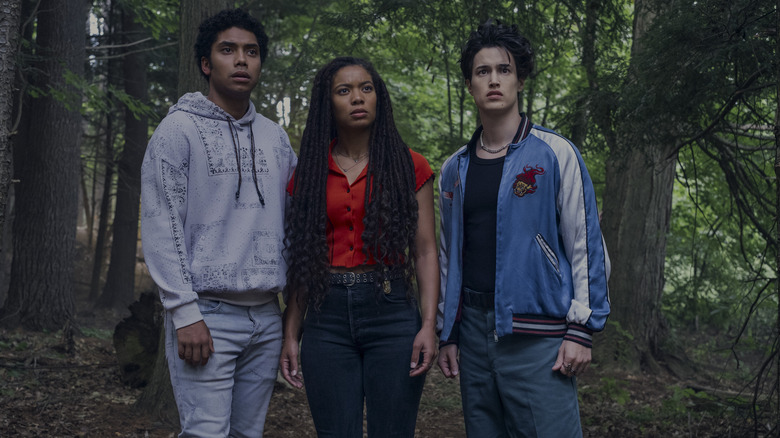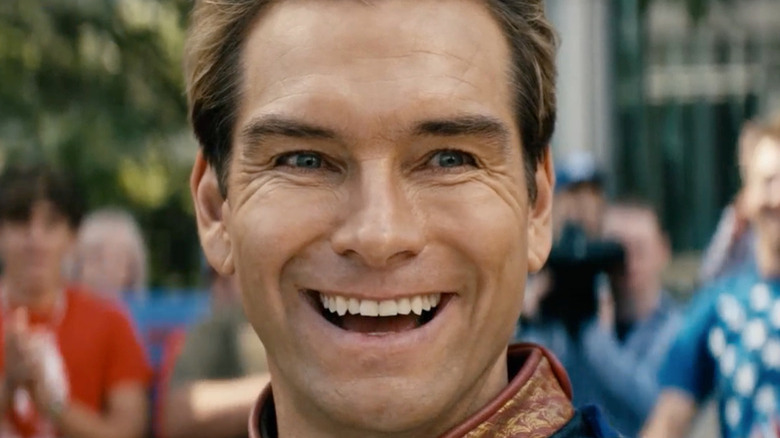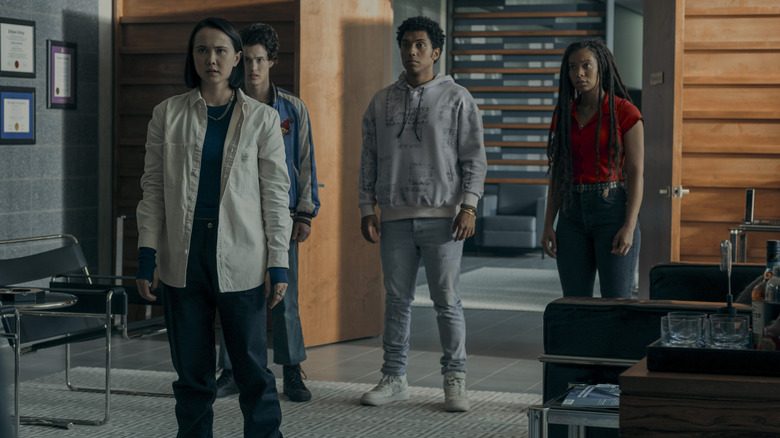Gen V Has Something No Other Current Superhero Show Has — Consequences
This article contains spoilers for the "Gen V" season 1 finale.
Superheroes are everywhere. But the truth is that most superhero stories on TV and film don't really matter. No matter how big the story seems, it doesn't feel like their respective universes change that much. Marvel characters have died, and big battles have been fought, but the Marvel Cinematic Universe doesn't look that different from how it was in the very first "Iron Man." This is to say, a show like "Gen V" makes for a refreshing change of pace.
"Gen V" is a spin-off of "The Boys" set at Godolkin University. The show follows a group of young would-be heroes trying to unravel the school's dark secret. At first glance, this has all the makings of a cash grab spin-off, a forced expansion of a story into an unnecessary cinematic universe with nothing to add but gratuitous sex and violence — despite the main show already having plenty of that. And yet, "Gen V" has turned out to be fantastic television so far The characters are compelling, the mystery is gripping, and there are nuanced explorations of many of the themes introduced in "The Boys" that can often get buried beneath that show's satire.
But the key to what makes "Gen V" not only entertaining, but also a standout superhero show, is that it has consequences. Over the course of a single season, the world that its characters live in has changed forever. The characters' actions had big consequences for themselves and those around them. What's more, "Gen V" has started paying off many of the game-changing reveals from "The Boys." Much more than a fun side story, but like "Herogasm" in the comics, this spinoff has the makings of a catalyst for the "Boys" universe's endgame.
Hurt people hurt people
From the moment the main characters discovered the secret lab underneath their school, "Gen V" has slowly unraveled a web of lies that's had big ramifications. This came to a bloody climax in the season 1 finale, "Guardians of Godolkin," when the telepathic Supe Cate (Maddie Phillips) freed all of the kids who'd spent years being experimented on at the school's The Woods facility. We spent all season exploring the repercussions of parents injecting their children with Compound V and trying to turn them into wealthy superheroes, while rejecting them when their powers proved too strong or weird. So when those Supes escaped from The Woods and began violently attacking all the non-Supes on campus for overlooking their abuse, it was hard not to at least sympathize with them.
We've seen these violent uprisings throughout history whenever marginalized groups finally decide they've had enough of those in power and decide to stand up. Yes, they're ruthlessly killing people, but hurt people hurt people — and these Supes have been hurt a lot.
By the end of "Guardians of Godolkin," The Woods has been destroyed and abandoned, and all its subjects are free. Meanwhile, the Vought executives are almost killed not by a single rogue Supe like Homelander, but by a wave of angry students tired of being treated differently. What's more, Homelander makes an expected appearance and seems to have fully turned into a superhero supremacist. He forces Vought to hail Cate and Sam as heroes of Godolkin (rather than Marie, who actually saved lives). This is more than just a group of students discovering the truth and keeping it quiet, it's a revolution.
The relationship between regular people and Supes is fundamentally broken (at least at Godolkin), and the genie can't go back into the bottle.
We're in the endgame now
Granted, all of this could be undone in the next season of "The Boys" or the recently-announced "Gen V" season 2. However, unlike, say, "Secret Invasion," which failed to even make its own story something that should impact the MCU in the future, "Gen V" season 1 made its plot feel important and significant. The larger MCU has barely even acknowledged the giant Celestial sticking out of the Earth from the end of "Eternals," but the truth is, "Eternals" barely cared to grapple with that image itself, so why should the rest of the franchise?
By comparison, the changes "Gen V" has introduced to the "Boys" universe are important to the former's characters from the very beginning. The Compound V reveal is a major reason why the series' characters are as angsty as they are. Homelander going rogue in season 3 of "The Boys" kickstarted a radical far-right wave on campus at the end of the season. The characters care about these developments and their journeys are affected by them, so the story has consequences not just for the show's little bubble, but the entire property.
Indeed, the "Gen V" season 1 finale teases a very dark future for the "Boys" universe, placing Homelander and Butcher on their main path from the comics. Homelander gaining a small army of supremacist Supes sets him on the path of open rebellion (one that will be hard to ignore in the future). Likewise, Butcher ends the season discovering the virus that can kill Supes, setting up a comic book storyline for "The Boys" season 4. While superhero adaptations are becoming stagnant, along comes "Gen V" to remind us why we fell in love with cinematic universes in the first place — because even side stories can matter.
"Gen V" season 1 is now streaming on Prime Video.


